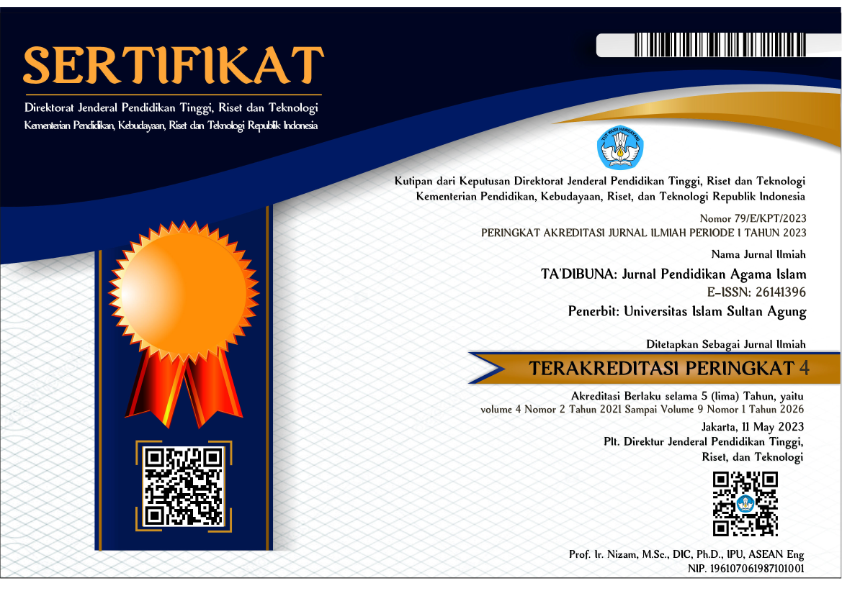Assessing the Preparedness of Islamic Religious Education Teachers in Indonesia for Technology-Based Learning Innovations
Abstract
Keywords
Full Text:
PDFReferences
Afikah, Adilah, Eli Rohaeti, Jumadi Jumadi, and Riki Perdana. 2023. “Student’s Higher-Order Thinking Skills and Collaboration Skills in Online Learning during Pandemic.†International Journal of Evaluation and Research in Education 12(1):23–33. doi: 10.11591/ijere.v12i1.23797.
Bikar, Soon Singh, Sabariah Sharif, Balan Rathakrishnan, and Rosy Talin. 2020. “Students’ Perceptions about the Use of Minimalist Robotic Games in Geography Education.†Review of International Geographical Education Online 10(4):584–95. doi: 10.33403/rigeo.739383.
Chai, Ching Sing. 2019. “Teacher Professional Development for Science, Technology, Engineering and Mathematics (STEM) Education: A Review from the Perspectives of Technological Pedagogical Content (TPACK).†Asia-Pacific Education Researcher 28(1):5–13. doi: 10.1007/s40299-018-0400-7.
Chatterjee, Sheshadri, Dipasree Majumdar, Sanjay Misra, and Robertas DamaÅ¡eviÄius. 2020. “Adoption of Mobile Applications for Teaching-Learning Process in Rural Girls’ Schools in India: An Empirical Study.†Education and Information Technologies 25(5):4057–76. doi: 10.1007/s10639-020-10168-6.
Gutiérrez-MartÃn, Alfonso, Ruth Pinedo-González, and Cristina Gil-Puente. 2022. “ICT and Media Competencies of Teachers. Convergence towards an Integrated MIL-ICT Model.†Comunicar 30(70):19–30. doi: 10.3916/C70-2022-02.
Islam, Direktorat Pendidikan Agama. 2023a. “Direktorat PAI Siap Laksanakan PPG 2022.†Retrieved (https://pendis.kemenag.go.id/pai/berita-488-direktorat-pai-siap-laksanakan-ppg-2022.html#informasi_judul).
Islam, Direktorat Pendidikan Agama. 2023b. “Tantangan Peningkatan Mutu Pembelajaran PAI Bagi Guru.†Retrieved (https://pendis.kemenag.go.id/pai/berita-158-tantangan-peningkatan-mutu-pembelajaran-pai-bagi-guru.html#informasi_judul).
Kemenag RI. 2023. “Ratusan Ribu Guru Pendidikan Islam Ikuti Pemetaan Kompetensi Kemenag.†Retrieved (https://kemenag.go.id/nasional/ratusan-ribu-guru-pendidikan-agama-islam-ikuti-pemetaan-kompetensi-kemenag-j58Rf).
Kurniawan, Muhammad Ragil, and Nurul Hidayati Rofiah. 2020. “Pola Penggunaan Internet Di Lingkungan Sekolah Dasar Se-Kota Yogyakarta.†Southeast Asian Journal of Islamic Education 2(2):93–105. doi: 10.21093/sajie.v2i2.1930.
Lee, Eunjung, Toula Kourgiantakis, and Ran Hu. 2022. “Developing Holistic Competence in Cross-Cultural Social Work Practice: Simulation-Based Learning Optimized by Blended Teaching Approach.†Social Work Education 41(5):820–36. doi: 10.1080/02615479.2021.1892055.
Ma, Li. 2021. “An Immersive Context Teaching Method for College English Based on Artificial Intelligence and Machine Learning in Virtual Reality Technology.†Mobile Information Systems 2021. doi: 10.1155/2021/2637439.
Mackenzie, Alexandra, and Adina Smith. 2021. “A Response to “Influence of Personality Traits and Learning Styles on Undergraduate Medical Students’ Academic Achievement†– a Medical Student Perspective [Letter].†Advances in Medical Education and Practice 12(April):853–54. doi: 10.2147/AMEP.S330684.
Mina, Lilian W. 2019. “Analyzing and Theorizing Writing Teachers’ Approaches to Using New Media Technologies.†Computers and Composition 52:1–16. doi: 10.1016/j.compcom.2019.01.002.
Mulasi, Syibran. 2019. “Problematika Pembelajaran Pai Pada Madrasah Tsnawiyah Di Wilayah Barat Selatan Aceh.†Jurnal Ilmiah Islam Futura 18(2):269. doi: 10.22373/jiif.v18i2.3367.
Nazilatus Syukriyah. 2020. “INOVASI MEDIA PEMBELAJARAN PENDIDIKAN ISLAM DI ERA 4.0 BERBASIS TEKNOLOGI AUGMENTED REALITY DI SMA SAINS AL-QUR’AN YOGYAKARTA.â€
Ningsih, Sutria, Eko Kuntarto, and Agung Rimba Kurniawan. 2020. “Teachers’ Problems in Using Information and Communication Technology (Ict) and Its Implications in Elementary Schools.†JURNAL PAJAR (Pendidikan Dan Pengajaran) 4(3):518. doi: 10.33578/pjr.v4i3.7964.
Novita, Almi, and M. Yunus Abu Bakar. 2021. “Konsep Pendidikan Esensialisme Dalam Pembentukan Karakter Siswa Pada Mata Pelajaran Pendidikan Islam.†Dirasat: Jurnal Manajemen Dan Pendidikan Islam 7(1):12–22.
Nugrahani, R., W. Wibawanto, R. Nazam, Syakir, and Supatmo. 2019. “Augmented Interactive Wall as a Technology-Based Art Learning Media.†Journal of Physics: Conference Series 1387(1). doi: 10.1088/1742-6596/1387/1/012114.
Nurbekova, Zhanat, Vadim Grinshkun, Gaukhar Aimicheva, Bakyt Nurbekov, and Kalima Tuenbaeva. 2020. “Project-Based Learning Approach for Teaching Mobile Application Development Using Visualization Technology.†International Journal of Emerging Technologies in Learning 15(8):130–43. doi: 10.3991/IJET.V15I08.12335.
Nurhidin, Edi. 2017. “Inovasi Pembelajaran Pendidikan Islam (PAI) Melalui Pemanfaatan Media Pembelajaran Kontekstual Dan Pengembangan Budaya Religius Di Sekolah.†Kuttab 1(1):1–14. doi: 10.30736/kuttab.v1i1.95.
Osborne, Jonathan F., Hilda Borko, Evan Fishman, Florencia Gomez Zaccarelli, Eric Berson, K. C. Busch, Emily Reigh, and Anita Tseng. 2019. “Impacts of a Practice-Based Professional Development Program on Elementary Teachers’ Facilitation of and Student Engagement With Scientific Argumentation.†American Educational Research Journal 56(4):1067–1112. doi: 10.3102/0002831218812059.
Putra, Andika Bagus Nur Rahma, Amat Mukhadis, Nurul Ulfatin, Tuwoso, Mahfudi Sahly Subandi, Hardika, and Abd Kadir Muhammad. 2021. “The Innovation of Disruptive Learning Media with Augmented Reality Based 3D Object Concept with Drill Machine Design to Improve Quality of Distance Learning in The Era of Education 4.0.†International Journal of Interactive Mobile Technologies 15(12):193–200. doi: 10.3991/ijim.v15i12.21579.
Rahmawati, Novi R., Sabiila Z. Izazi, Nailul Muna, Ulfatun Ni’mah, and Tanya Fawzi. 2020. “Bentuk Kolaborasi Guru Bimbingan Dan Konseling Dengan Guru Mata Pelajaran Dalam Mengatasi Permasalahan Peserta Didik.†Al-Tazkiah 9(2):155–72.
Rahmi, Mayangsari Nikmatur, and M. Agu. Samsudi. 2020. “Pemanfaatan Media Pembelajaran Berbasis Teknologi Sesuai Dengan Karakteristik Gaya Belajar.†Edumaspul: Jurnal Pendidikan 4(2):355–63. doi: 10.33487/edumaspul.v4i2.439.
Ratnawati, Siti Rohmaturrosyidah, and Wilis Werdiningsih. 2020. “Pemanfaatan E-Learning Sebagai Inovasi Media Pembelajaran PAI Di Era Revolusi Industri 4.0.†Belajea; Jurnal Pendidikan Islam 5(2):199. doi: 10.29240/belajea.v5i2.1429.
Raza, Muhammad Riaz, and Aslam Parvez. 2019. “Impact of Media Literacy and Media Technology on Agenda-Setting A Case Study of Broadcast Media in Pakistan.†Pakistan Journal of Distance & Online Learing V(1):137–54.
Sailer, Michael, Matthias Stadler, Florian Schultz-Pernice, Ulrike Franke, Carola Schöffmann, Viktoriia Paniotova, Lana Husagic, and Frank Fischer. 2021. “Technology-Related Teaching Skills and Attitudes: Validation of a Scenario-Based Self-Assessment Instrument for Teachers.†Computers in Human Behavior 115(October 2020). doi: 10.1016/j.chb.2020.106625.
Sutisna, Usman, Mia Fitriah Elkarimah, and Fery Rahmawan Asma. 2020. “Pengembangan Kompetensi Profesional Guru PAI Melalui Pemanfaatan Teknologi Informasi.†ABSYARA: Jurnal Pengabdian Pada Masyarakat 1(2):9–14. doi: 10.29408/ab.v1i2.2629.
Tozer, Brett C. 2022. “Understanding High School Teachers ’ Perceived Discouragements to Use Social Media Communication Technologies as a Pedagogical Tool to Improve Future Technology Integration Initiatives.†8:259–81.
Wilson, Joshua, Cristina Ahrendt, Emily A. Fudge, Alexandria Raiche, Gaysha Beard, and Charles MacArthur. 2021. “Elementary Teachers’ Perceptions of Automated Feedback and Automated Scoring: Transforming the Teaching and Learning of Writing Using Automated Writing Evaluation.†Computers and Education 168(April):104208. doi: 10.1016/j.compedu.2021.104208.
Wu, Hongxia. 2021. “Multimedia Interaction-Based Computer-Aided Translation Technology in Applied English Teaching.†Mobile Information Systems 2021. doi: 10.1155/2021/5578476.
Zhang, Si, Qingtang Liu, and Zhiqiang Cai. 2019. “Exploring Primary School Teachers’ Technological Pedagogical Content Knowledge (TPACK) in Online Collaborative Discourse: An Epistemic Network Analysis.†British Journal of Educational Technology 50(6):3437–55. doi: 10.1111/bjet.12751.
DOI: http://dx.doi.org/10.30659/jpai.6.2.91-105
Refbacks
- There are currently no refbacks.
Â
Ta'dibuna: Jurnal Pendidikan Agama Islam is published by Master Program of Islamic Education, Faculty of Islamic Studies, Universitas Islam Sultan Agung (UNISSULA), Indonesia.
Jl. Raya Kaligawe Km.4, PO BOX 1054/SM Semarang, Indonesia 50112. Email: jurnaltadibuna@unissula.ac.id.ÂÂ






